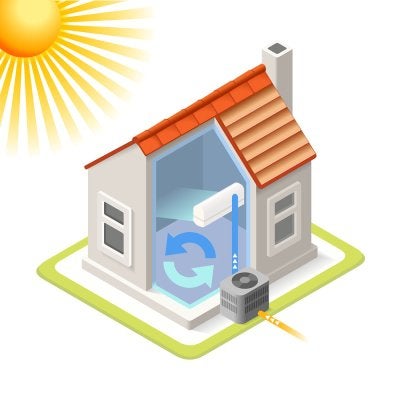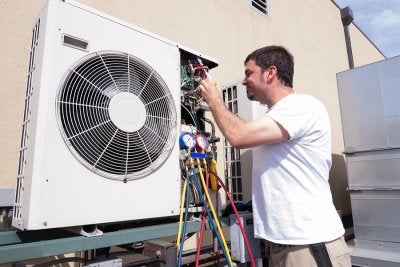-
Taking Good Care of Your Air Conditioner
For many people, having a well-functioning AC unit is essential for staying comfortable during the summer months. If you want to get a long life and the maximum efficiency from the air conditioning unit in your Seattle home, regular upkeep is a must. Here, you’ll find several tips to help you keep your air conditioner in good shape:
Pay attention to the filter.
 Your AC’s filter plays an important role in improving your indoor air quality and helping the unit run efficiently. The air filter is housed at the air intake and is responsible for trapping particles from the air as they’re drawn into the air conditioner. By trapping these airborne particles, the filter ensures that there will be less of them floating around your home and settling on your furniture. Air filters can be either reusable, which require cleaning, or disposable, which should regularly be replaced. You should clean or replace your filter at least once per month for optimum efficiency and to help keep your indoor air clean.
Your AC’s filter plays an important role in improving your indoor air quality and helping the unit run efficiently. The air filter is housed at the air intake and is responsible for trapping particles from the air as they’re drawn into the air conditioner. By trapping these airborne particles, the filter ensures that there will be less of them floating around your home and settling on your furniture. Air filters can be either reusable, which require cleaning, or disposable, which should regularly be replaced. You should clean or replace your filter at least once per month for optimum efficiency and to help keep your indoor air clean.Clean the area around your air conditioner.
Minimizing the amount of debris around your air conditioner can help it run better and require less frequent cleanings. Regularly remove fallen leaves and similar items that accumulate near the condenser unit, and trim back any foliage that may be hindering air flow.
Schedule regular maintenance.
When it comes to repairs and more in-depth maintenance, it’s a good idea to hire a professional. When you schedule a tune-up appointment with an HVAC technician, he will perform several steps to help keep your air conditioner working well. He should ensure that the unit has sufficient refrigerant and test for leaks, measure how much air is flowing through the evaporator coil, and check the duct system for holes. You can also expect him to make sure that the thermostat is functioning properly, inspect electrical terminals, and tighten and clean connections. You should schedule professional air conditioner maintenance at least once per year to take good care of your unit.
““
-
How Do Heat Pumps Work?
For many people, the first thing that comes to mind when they need to lower the temperature in their home is to turn on the AC. Many households use air conditioners to stay cool during the summer, but heat pumps near Seattle can provide the same effect while using less energy.
Heat pumps are energy-efficient heating and cooling units.
 Because of their name, the average person wouldn’t expect a heat pump to have anything to do with cooling. These units can have the dual purpose of heating your home in the winter, and keeping it cool during the summer. Heat pumps are units that use a small amount of energy to move heat to a different location. These devices are ideal for use in climates that enjoy moderate temperatures without hot or cold extremes. When installed in less temperate zones, supplemental heating or air conditioning may be necessary.
Because of their name, the average person wouldn’t expect a heat pump to have anything to do with cooling. These units can have the dual purpose of heating your home in the winter, and keeping it cool during the summer. Heat pumps are units that use a small amount of energy to move heat to a different location. These devices are ideal for use in climates that enjoy moderate temperatures without hot or cold extremes. When installed in less temperate zones, supplemental heating or air conditioning may be necessary.Heat pumps rely on heat transfer to warm or cool your home.
A heat pump’s purpose is to pull heat from the air or the ground, and then move it to another location. These units use mechanical-compression style refrigeration and typically consist of two components. The indoor part, which is called the air handler, contains the blower, which moves air into your home. The outside section, which is the heat pump, resembles an air conditioning unit and is responsible for heat transfer. Heat pumps come in a variety of styles, but their basic principle for operation is heat transfer. In the case of cooling your home, the machine works by pulling warmth from inside the home and moving it outside.
Heat pumps may offer you several advantages.
Heat pumps are single unit devices that are used for both heating and cooling, often making them more convenient to install than an HVAC system. Also, because they run on electricity and do not require fuel to heat or cool a space, they are energy-efficient and can save you significantly energy costs.
-
The Olson Energy Service Story
Olson Energy Service specializes in electrical, water heater, air conditioner, air duct cleaning, boiler, heat pump, and furnace services in Seattle. Family-owned and operated, Olson Energy Service has provided the Greater Seattle Area with decades of first-rate, experienced, and reliable service.
Founded by Garnett Olson in 1926, Olson Energy Service began as Olson Fuel Company, which sold coal and firewood to homes and businesses. By the 1930s, heating fuel preferences shifted towards oil, and the company expanded to include this service. Generations of Olsons have worked for Olson Fuel Company, which became Olson Energy Service in the early 1990s as its range of services grew.
Today, Olson Energy Service boasts numerous affiliations and awards and is among the premier HVAC contractors for Seattle. Our experienced staff continues to provide exceptional, professional, and quality service throughout the Greater Seattle Area and looks forward to helping you with your heating and cooling needs.
““
-
What is a Mini-Split Air Conditioner?
Are you considering your different options for air conditioning near Seattle? Mini-split systems offer heating and cooling solutions for areas that lack central air conditioners or heating systems.
Design
Mini-split air conditioners are ductless units that are used to cool a room or area of a building. These units are similar to central systems in that they have both an indoor and outdoor component. Mini-splits consist of an outdoor condenser/compressor and an indoor air-handling unit.
Uses
 While there are numerous potential applications for these air conditioners, most often they are installed as retrofit add-ons for buildings that lack a ducted heating system. Examples can include homes that are heated using radiant panels, space heaters, or hot water heat. Mini-split air conditioners are also an excellent cooling solution for small apartments and room additions where it may not be feasible to install ductwork.
While there are numerous potential applications for these air conditioners, most often they are installed as retrofit add-ons for buildings that lack a ducted heating system. Examples can include homes that are heated using radiant panels, space heaters, or hot water heat. Mini-split air conditioners are also an excellent cooling solution for small apartments and room additions where it may not be feasible to install ductwork.Advantages
Due to their small size and the flexibility of their installation, mini-split air conditioners can be used to cool a single area or room. Additionally, many models can have up to 4 indoor handling units connected to a single outdoor condenser/compressor. Because each indoor unit has an individual thermostat, you can save money by cooling only the areas that you wish. Mini-splits also tend to be easier to install than other cooling systems. Most styles require only a 3-inch-wide hole through the wall to connect the indoor and outdoor components, and your indoor air-handling units can be as far as 50 feet from the outdoor apparatus. This allows home and business owners to install the outside section in an inconspicuous place, if necessary.
Disadvantages
The primary drawback that you will face if you opt for a mini-split air conditioner is the cost. These systems will require more investment per ton of cooling capacity when compared to central units, assuming there is already ductwork present, and can cost significantly more than a window cooling unit. Additionally, mini-splits can be more conspicuous than central air vents, but they are generally less obtrusive than window air conditioners.
““
-
Get the Most Out of Your Air Conditioner
A lack of proper maintenance is the primary reason that HVAC units fail. If your air conditioning near Seattle hasn’t been inspected for over a year, it may not be functioning at maximum efficiency. Watch this video for tips on getting the most out of your air conditioner.
If your A/C sounds noisy, keeps turning on and off, or seems to be running all day, then you may benefit by scheduling air conditioner maintenance. Also, a rise in the cost of your monthly energy bill or a higher humidity level in your home are both indicators that the unit may be functioning poorly and can benefit from a tune-up. Your air conditioner loses an estimated 5% of its efficiency each year that it isn’t inspected and cleaned.
RECENT POSTS
categories
- Uncategorized
- Air Conditioner
- Fireplace Inserts
- Fireplace Insert Installation
- Air Conditioning Installations
- Air Conditioning Units
- Air Conditioner Maintenance
- HVAC Professionals
- Heat Pump Installation
- Heating and Cooling
- HVAC Unit
- Heat Pumps
- Furnace
- Furnace Service
- Tankless Water Heaters
- Water Heaters
- Energy Efficiency
- HVAC Contractors
- Olson Energy Service
- Mini-Split Systems
- Ductless Air Conditioner
